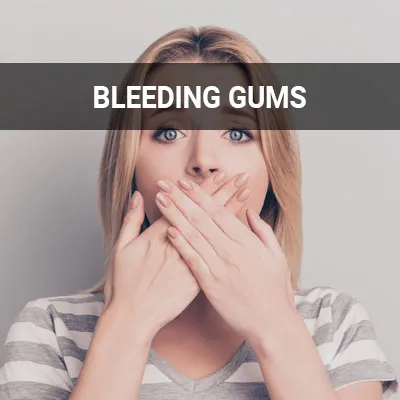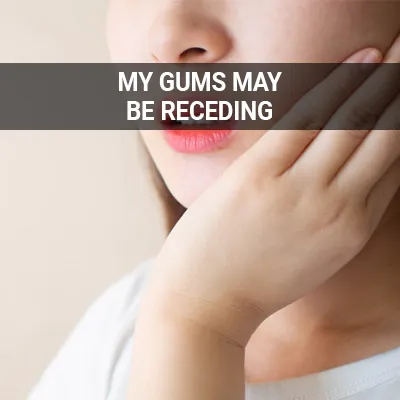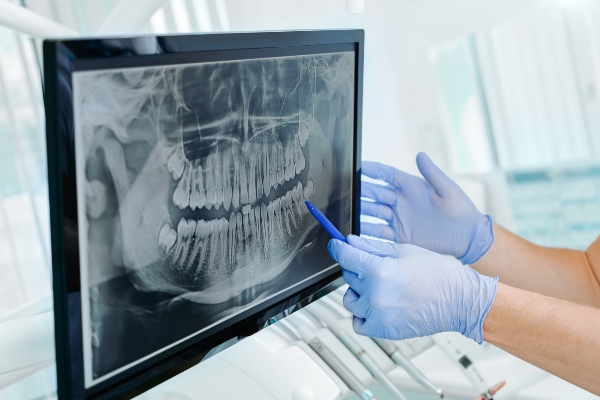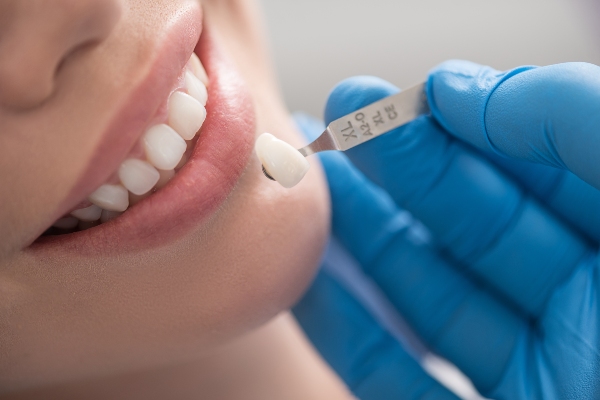Gum Disease Roseville, CA
Gum disease is a serious condition that can infect the gums, destroying the jaw and underlying bone. There are many ways to prevent gum disease and various treatment options for patients who acquire it. Effective and successful gum disease treatment involves detection in the early stages before any severe damage to the gums, bone, or jaw can occur.
Gum disease treatment is available at Fountains Dental Excellence in Roseville and the surrounding area. We can help diagnose and treat gum disease while providing patients with tips on how to maintain a healthy oral cavity. Call us today at (916) 839-3035 to schedule an appointment or learn more about our services.
Understanding Gum Disease and Its Causes
Gum disease is an oral health condition involving severe inflammation of the gingival tissue that surrounds and protects the teeth. Gum disease is caused by plaque, a sticky film that forms on the surface of the teeth and acts as a breeding ground for harmful bacteria to grow. A buildup of plaque causes inflammation that can progress into an infection.
Gum disease is a major cause of edentulous, or tooth loss, in adults. Other common complications that can arise from gum disease include advanced periodontal disease, respiratory disease, rheumatoid arthritis, coronary artery disease, and problems controlling blood sugar in diabetes. As the mouth is a leading gateway to the rest of the body, bacteria from plaque buildup can travel through the bloodstream and affect the airways and other organs.
“Gum disease is caused by plaque, a sticky film that forms on the teeth’s surfaces, and acts as a breeding ground for harmful bacteria to grow.”
Preventing Gum Disease
Most cases of gum disease are caused by poor oral hygiene. Unsurprisingly, maintaining a good oral hygiene routine is one of the first lines of defense in protecting oneself against gum disease. Patients should brush their teeth for two minutes at least twice a day and floss at least once a day. Flossing before brushing is imperative, as this allows the patient to clean away any loosened food particles and bacteria. Routine dental visits are also key in preventing gum disease, especially for patients already at risk of developing gum disease. These patients include those who smoke, take certain medications, or suffer from dry mouth. Ideally, patients should have their teeth professionally cleaned every six to 12 months.
“Most cases of gum disease are caused by poor oral hygiene.”
Symptoms of Gum Disease
Gum disease may go unnoticed for some time, especially as it is not always accompanied by pain. Even symptoms in the late stages of gum disease can be very subtle. It is crucial for patients to know the signs of gum disease, so they know how to identify them. Common symptoms of gum disease include but are not limited to:
- Changes in the bite
- Changes in the fit of partial dentures
- Formation of deep pockets between teeth and gums
- Gums that bleed after and during brushing teeth
- Loose or shifting teeth
- Persistent bad breath or taste in the mouth
- Receding gums
- Red, swollen, or tender gums
Patients may still be afflicted by gum disease even without these symptoms. Some people, for instance, may only have gum disease that affects certain teeth. Our team can help identify any dental problems you may have.
“It is crucial for patients to know the signs of gum disease, so they know how to identify them.”
Check out what others are saying about our dental services on Yelp: Gum Disease in Roseville, CA
Treatment Options
To properly diagnose a patient with gum disease, we measure the pocket depths between the gums and the teeth. Healthy teeth measure about 1 to 3 mm depth, while unhealthy teeth measure pocket depths up to 6 mm. This measurement, also called periodontal probing, also tells us how severe the patient's condition is. We also take X-rays and conduct a physical examination of the mouth.
The National Health Service (NHS) describes a few dental procedures that have been found effective in treating gum disease, including scale and polish, root planing, and surgery. Flap surgery, a common minor surgical procedure, involves lifting the gums back, thoroughly cleaning out the infection, and reshaping the bone. The flap is then reattached to the teeth more firmly as to solve the deep pocket depths present before surgery. The gums then naturally heal over the teeth.
“The NHS describes a few dental procedures that have been found effective in treating gum disease, including scale and polish, root planing, and surgery.”
Questions Answered on This Page
Q. How can I prevent gum disease?
Q. What are the signs of gum disease?
Q. What is gum disease and what causes it?
Q. What are some treatment options for gum disease?
People Also Ask
Q. What can I do about receding gums?
Q. What lifestyle factors can trigger gum bleeding?
Q. How can someone know what type of dental provider they need?
Q. What are the causes of gum recession?
Q. What are the benefits of gum contouring?
Q. What are signs of oral cancer?
Q. What family members may need extra help with their oral hygiene?
Gum Disease Statistics
According to the Centers for Disease Control and Prevention (CDC), almost half of all adults in the United States have some form of periodontal disease. This number increases with age, with 70% of adults 65 years and older reporting to have the condition. Furthermore, it is more common among men than women. To address such problems, the CDC is working with organizations like the American Academy of Periodontology and the American Dental Association to "improve and sustain surveillance of periodontal disease in the adult U.S. population."
“According to the Centers for Disease Control and Prevention (CDC), almost half of all adults in the United States have some form of periodontal disease.”
Frequently Asked Questions
Q. Is gum disease curable?
A. Gum disease is reversible in mild to moderate cases in which the infection has not caused severe side effects, such as tooth loss. Periodontal disease, the advanced stage of gum disease, is not reversible. It is important to undergo treatment immediately after a diagnosis to prevent further progression of the disease.
Q. What is the link between gum disease and cardiovascular disease?
A. The mouth is one of the main entryways to the rest of the body and any bacteria, good or bad, travels through the airways to the respiratory system. Plaque is an extremely harmful bacteria that can clog arteries and the heart valves, causing cardiovascular problems.
Q. How can I treat gum disease at home?
A. There are many at-home treatments for gum disease today, including special tools and mouthwashes that help strengthen the gums and remove plaque. However, no at-home treatment trumps professional dental cleanings. We use medical-grade tools made especially for the teeth and gums and have the necessary training to combat oral disease and infection. Even a simple routine dental cleaning can reduce or eliminate gum disease by clearing the pockets and minimizing depths.
Q. How much does gum flap surgery cost?
A. Flap surgery, also called surgical pocket reduction, is considered a minor surgery. The surgery typically costs between $1,000 to $3,000 for patients paying out-of-pocket. Most insurance plans cover gum disease treatment as it is a severe condition that can put a patient's oral health at risk. We encourage patients to talk to their insurance provider to fully understand what their plan entails.
Q. What if gum disease is left untreated?
A. When gum disease goes untreated, the infection inevitably spreads and destroys more of the gums, underlying bone, and jaw. That is why loose teeth and tooth loss are common complications of the disease. Gum disease can also result in cardiovascular and respiratory issues as plaque travels through the mouth to the airways and valves within our other body systems.
Gum Disease Terminology
Learn More Today
Gum disease may lead to worse oral health problems further along the line. We at Fountains Dental Excellence may be able to help. Call us today at (916) 839-3035 to schedule an appointment and learn more.
Helpful Related Links
- American Dental Association (ADA). Glossary of Dental Clinical Terms. 2025
- American Academy of Cosmetic Dentistry® (AACD). Home Page. 2025
- WebMD. WebMD’s Oral Care Guide. 2025
About our business, license, and website security
- Fountains Dental Excellence was established in 2009.
- We accept the following payment methods: American Express, Cash, Check, Discover, MasterCard, and Visa
- We serve patients from the following counties: Placer County
- We serve patients from the following cities: Roseville, Loomis, Rocklin, Penryn, and Lincoln
- CA (License #103949). View License Information and Specifics
- National Provider Identifier Database (1457904773). View NPI Registry Information
- Norton Safe Web. View Details
- Trend Micro Site Safety Center. View Details
Back to top of Gum Disease











